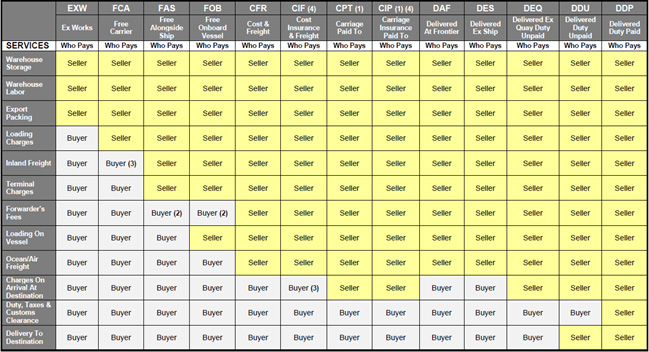steam ship line
Any mode of transport
EXW - Ex Works
The buyer is responsible for unloading. This term places the maximum obligation on the buyer and minimum obligations on the seller. The Ex Works term is often used when making an initial quotation for the sale of goods without any costs included.
EXW means that a seller has the goods ready for collection at his premises (works, factory, warehouse, plant) on the date agreed upon. The buyer pays all transportation costs and also bears the risks for bringing the goods to their final destination. The seller doesn't load the goods on collecting vehicles and doesn't clear them for export.
If the seller does load the good, he does so at buyer's risk and cost. If parties wish seller be responsible for the loading of the goods on departure and to bear the risk and all costs of such loading, this must be made clear by adding explicit wording to this effect in the contract of sale.
FCA - Free Carrier
The seller hands over the goods, cleared for export, into the disposal of the first carrier (named by the buyer) at the named place. The buyer pays for carriage to the named point of delivery, and risk passes when the goods are handed over to the first carrier.
CPT - Carriage Paid To
The seller pays for carriage. Risk transfers to buyer upon handing goods over to the first carrier at place of Import.
CIP - Carriage and Insurance Paid to
The containerized transport/multimodal equivalent of CIF. Seller pays for carriage and insurance to the named destination point, but risk passes when the goods are handed over to the first carrier.
DAT - Delivered at Terminal
Seller pays for carriage to the terminal, except for costs related to import clearance, and assumes all risks up to the point that the goods are unloaded at the terminal.
DAP - Delivered at Place
Seller pays for carriage to the named place, except for costs related to import clearance, and assumes all risks prior to the point that the goods are ready for unloading by the buyer.
DDP - Delivered Duty Paid
Seller is responsible for delivering the goods to the named place in the country of the buyer, and pays all costs in bringing the goods to the destination including import duties and taxes. The buyer is responsible for unloading. This term is often used in place of the non-Incoterm "Free In Store (FIS)". This term places the maximum obligations on the seller and minimum obligations on the buyer.
Sea and inland waterway transport
FAS - Free Alongside Ship
The seller must place the goods alongside the ship at the named port. The seller must clear the goods for export. Suitable only for maritime transport but NOT for multimodal sea transport in containers. This term is typically used for heavy-lift or bulk cargo.
FOB - Free on Board
The seller must load the goods on board the vessel nominated by the buyer. Cost and risk are divided when the goods are actually on board of the vessel (this rule is new!). The seller must clear the goods for export. The term is applicable for maritime and inland waterway transport only but NOT for multimodal sea transport in containers. The buyer must instruct the seller the details of the vessel and the port where the goods are to be loaded, and there is no reference to, or provision for, the use of a carrier or forwarder.
CFR - Cost and Freight
Seller must pay the costs and freight to bring the goods to the port of destination. However, risk is transferred to the buyer once the goods are loaded on the vessel. Insurance for the goods is NOT included. This term is formerly known as CNF (C&F). Maritime transport only.
CIF - Cost, Insurance and Freight
Exactly the same as CFR except that the seller must in addition procure and pay for the insurance. Maritime transport only.
Incoterms chart

- (1) Risk of loss or damage is transferred from Seller to Buyer when the goods have been delivered to the carrier.
- (2) Payment of the Freight Forwarders Fees can be controversial, depending on the Contract of Sale.
- (3) Responsibility may be either the Buyer or the Seller.
- (4) While the Seller is responsible for insurance coverage during the main voyage, the buyer may have additional "insurable interest"

